

:In recent years, Canada has continued to attract a growing number of international students due to its exceptional quality of education and rich cultural exposure. This guide explores the quality of life that international students can anticipate while studying in Canada, offering valuable insights into the various dimensions that shape their everyday experiences.
From accommodation choices to financial considerations, this comprehensive resource aims to provide international students with a comprehensive understanding of the realities of living and studying in Canada.
In this blog we will cover the following 17 topics:
Canada stands as a prominent global education destination, renowned for its top-tier institutions and diverse academic offerings. For an undergraduate program in Canada, the average annual tuition fee for international students can be approximately CAN $29,714.
These figures can vary widely based on factors such as the program of study, the university's reputation, and the province. Some specialized programs or elite universities might have higher tuition fees.
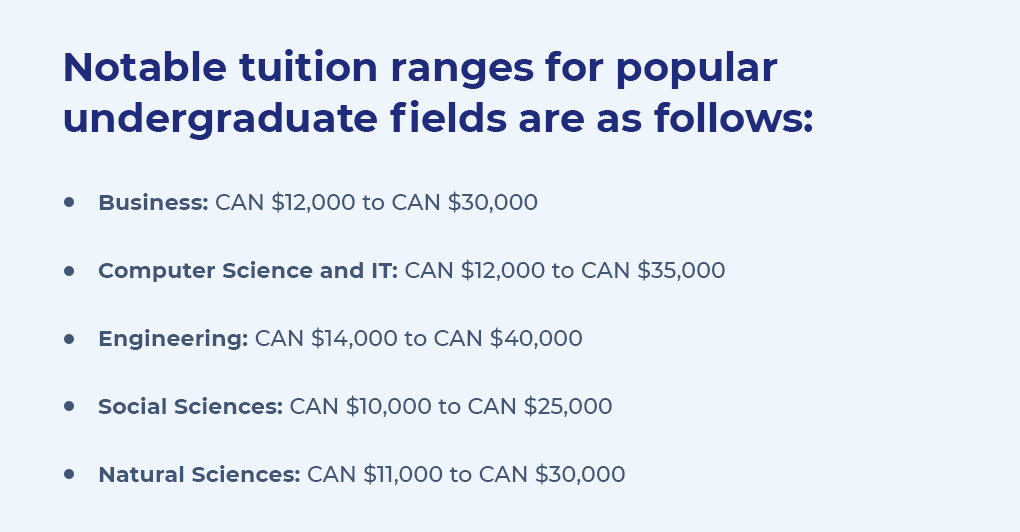
For sought-after postgraduate programs in Canada, the average tuition can range from CAN $10,000 to CAN $35,000 for domestic students and from CAN $16,000 to CAN $40,000 for international students.
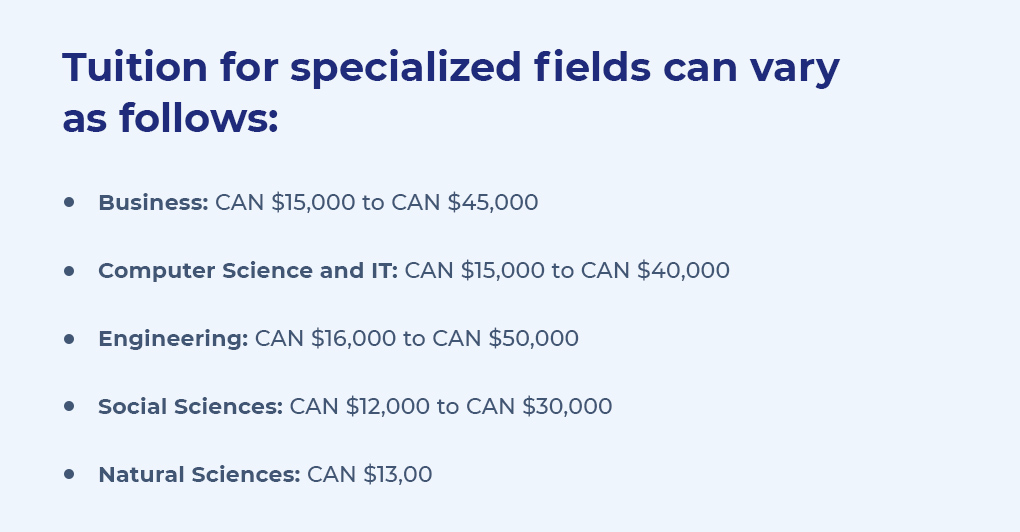
These figures provide an initial understanding to aid students in assessing the financial aspect of pursuing higher education in Canada.
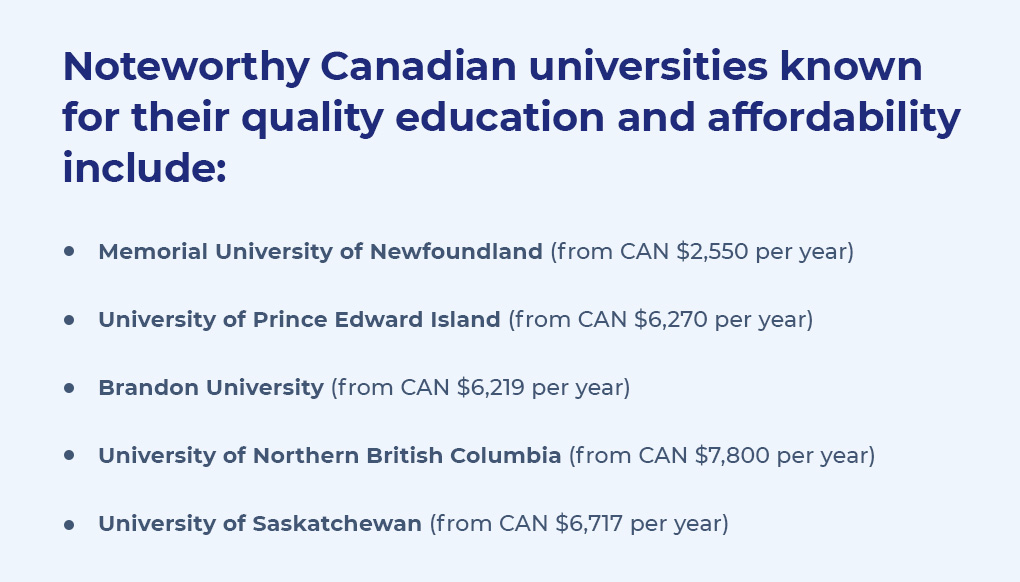
There are various accommodation options available for international students in Canada, each with its associated costs and details.
On-campus housing, also known as university residences, provides students with convenient access to campus facilities and a chance to immerse themselves in the university community.
Cost: The cost of on-campus housing varies depending on factors like the university's location, room type, and included amenities. On average, you can expect to pay around CAN $4,000 to CAN $12,000 per academic year. En-suite or apartment-style rooms tend to be on the higher end.
Off-campus housing includes renting apartments, condos, or houses from private landlords or property management companies.
Cost: The cost of off-campus housing varies greatly based on the location, size, and type of accommodation. In cities like Toronto or Vancouver, you might pay around CAN $800 to CAN $2,500 per month for a one-bedroom apartment.
Homestays involve living with a local host family, providing students with a chance to experience Canadian culture firsthand.
Cost: The cost of homestays depends on factors like the location, meals provided, and level of comfort. On average, you might expect to pay around CAN $700 to CAN $1,200 per month.
Shared accommodation, often in the form of shared apartments or houses, allows students to split the rent and living costs with roommates.
Cost: The cost of shared accommodation varies based on location and the number of roommates. It's generally more affordable than renting a private apartment.
Short-term accommodation options like hostels, guesthouses, or temporary rentals are suitable for students arriving in Canada who need a temporary place to stay while searching for more permanent housing.
Cost: Temporary accommodations vary in cost. Hostels and guesthouses are usually more budget-friendly, while serviced apartments offer more amenities at a higher cost.
These various accommodation options and their associated costs give international students an understanding of the accommodation landscape in Canada, helping them plan their living arrangements effectively.

Considering the cost of living in Canada, managing your food and grocery budget is a crucial aspect for international students. Canada offers a diverse culinary scene, ranging from cooking at home to dining out at local eateries.
Let's delve into the specifics of food expenses and effective strategies for budget management.
Preparing your meals at home presents a cost-efficient choice, giving you control over your spending and dietary preferences. Here's an overview of what you can anticipate:
While home-cooking is economical, occasional dining out can be a delightful experience. Here's what you can expect when dining out:
Cafes and Quick Eateries: Affordable options like cafes and fast-food establishments offer convenient and budget-friendly meals. A meal at a fast-food restaurant might cost around CAN $10 to CAN $20.
Restaurants: Dining at mid-range restaurants or local eateries can be a slightly higher expense, with meals typically ranging from CAN $20 to CAN $50 per person, excluding beverages.
These insights into food and grocery costs and management strategies aim to help international students navigate their culinary expenses in Canada effectively.

Navigating transportation in Canada is a significant consideration for international students. The country offers a well-developed transportation network encompassing public transit options and other modes of travel. Understanding transportation costs and making informed decisions can contribute to effective budget management.
Canada's cities feature efficient public transportation systems, including buses, trains, subways, and light rail systems. Here's what you need to know:
Smart Cards: Many cities offer smart card systems for accessing public transportation. In Toronto, for example, the Presto card is commonly used for the subway, buses, and streetcars. It provides discounted fares compared to single tickets.
Fares: The cost of public transportation varies based on location and usage frequency. On average, you might spend around CAN $100 to CAN $150 per month on public transit passes. Monthly or yearly passes usually offer better value.
Cycling is a popular and environmentally friendly mode of transportation in Canada. Numerous cities have dedicated bike lanes and bike-sharing initiatives.
Cost:: If you own a bicycle, cycling can be a cost-effective transportation option. Alternatively, you can consider buying a second-hand bike or using a bike-sharing service, which might cost around CAN $2 to CAN $10 for short rides.
Taxis and ride-sharing services like Uber are available in urban areas. While convenient, they tend to be pricier compared to public transportation.
Cost:: Taxi and ride-sharing expenses depend on travel distance. It's advisable to use these services for special occasions or when time is a factor.
Understanding the transportation options and associated costs in Canada can help international students make informed choices about getting around and effectively managing their transportation budget.

Balancing academics with leisure activities is essential while studying in Canada, and the country offers a diverse range of cultural experiences and entertainment options for international students.
Here's a comprehensive guide to managing your leisure expenses and maximizing your leisure time.
Canada is rich in history and culture, with numerous museums, galleries, and historical sites to explore. Many of these attractions offer discounted or free entry for students.
Cost:Entry fees vary depending on the attraction. Some museums and galleries offer free entry, while others might charge around CAN $10 to CAN $20 for students.
Cities across Canada boast vibrant performing arts scenes with theatre productions, musicals, ballets, and more. You can enjoy a wide range of performances.
Cost: Ticket prices vary based on the production and seating. Student discounts are often available for theatre and performing arts events.
From live music venues to nightclubs, Canada offers a lively music and nightlife scene. Major cities host concerts, gigs, and DJ nights.
Cost: Concert ticket prices vary widely depending on the artist and venue. Nightclubs might have an entry fee, especially on weekends.
Canada is renowned for its natural beauty and outdoor spaces. You can partake in activities like hiking, picnicking, and more.
Cost: Many parks are free to access. Some outdoor activities might have associated costs, such as equipment rentals.
Canadian universities offer a variety of student clubs and societies catering to diverse interests. These groups provide opportunities for socializing and pursuing hobbies.
Cost: Membership fees for student clubs and societies are typically reasonable and provide access to events and activities.
Canada's mobile market includes major network operators like Rogers, Bell, and Telus, along with various Mobile Virtual Network Operators (MVNOs) that use their infrastructure.
Coverage:
Most of Canada has strong mobile coverage, with urban areas having extensive 4G and limited 5G services. Remote areas might have reduced coverage but maintain 3G or 4G.
Cost: Basic pay-as-you-go (PAYG) plans start around CAN $10, including minutes, texts, and data. Contract plans with smartphones typically start at CAN $40 and vary based on the phone and package.
Internet Connectivity in Canada:
Canada's broadband landscape offers options from providers like Rogers, Bell, and Shaw.
Types of Broadband:The country offers various broadband types, including DSL and fibre optic, which provide high-speed internet.
Cost: Standard packages for browsing and streaming range from CAN $50 to CAN $80 per month. Fibre optic packages, offering speeds up to 300 Mbps, typically range from CAN $60 to CAN $100 per month.
Installation: New connections might have installation fees, waived during promotions or longer contracts.
Understanding these entertainment and connectivity options in Canada helps international students optimize their leisure experiences and manage their essential connectivity needs.

Striking a balance between studies and part-time work is an excellent way for international students to manage expenses and gain valuable work experience during their time in Canada.
Here's a comprehensive guide to understanding the part-time work opportunities available for international students in Canada.
Canadian universities often offer on-campus job opportunities tailored to international students. These positions are designed to be flexible and accommodating of your academic commitments.
Types of On-Campus Jobs:
Research Assistants Work Hours: : On-campus jobs generally allow up to 20 hours of work per week during academic terms and full-time during breaks.
Advantages:
International students in Canada with a valid study permit are permitted to work off-campus. This provides a chance to gain diverse work experience and insight into the local job market.
Types of Off-Campus Jobs:
Internships Work Hours: Similar to on-campus roles, off-campus employment typically allows up to 20 hours of work per week during academic terms and full-time during breaks.
Advantages:
Understanding regulations is crucial when seeking part-time work as an international student in Canada:
• Work Hours: While studying, you can work up to 20 hours per week during academic terms and full-time during scheduled breaks.
Minimum Wage: Canada sets minimum wage standards that employers must adhere to. Research the current minimum wage rates in your province.
Social Insurance Number (SIN): To work legally in Canada, you need a Social Insurance Number (SIN). You can apply for one upon arrival.
Balancing Work and Studies: Maintaining a healthy balance between work and academics is vital:
Time Management: Organize your work schedule around your classes and study sessions to ensure you allocate sufficient time to both.
Prioritize Studies: Remember that your primary reason for being in Canada is education. Ensure that work commitments don't hinder your academic performance.
Communication: If you encounter challenges managing work and studies, communicate with your employer to discuss potential adjustments to your work schedule.
This guide equips international students in Canada with the knowledge to make informed decisions about part-time work opportunities, fostering a balanced and successful academic and work experience.

The "Post-Graduation Work Permit (PGWP)" offers international students the chance to stay and work in Canada after completing their studies. Under this permit, you can work for up to 3 years depending on the length of your study program. Eligibility criteria and application process for the PGWP include the following:
Eligibility Criteria for Post-Graduation Work Permit (PGWP) in Canada:
Earlier, graduates were only allowed to work for up to 3 years. However, now, graduates can work for up to 3 years, promoting career development and growth in various fields.
Advantages of the Post-Graduation Work Permit (PGWP):
Please note that information and policies might change over time, so always refer to the official IRCC website or relevant authorities for the most up-to-date details.

When considering studying in Canada, understanding the cost of living and currency exchange rates is crucial for international students. Estimating daily expenses involves converting your home currency into Canadian Dollars (CAN). Various exchange services and banks might apply markup to the exchange rate, impacting the amount you receive. It's essential for prospective students to explore both affordable and higher-cost cities in Canada to gain a comprehensive understanding of potential living expenses during their academic journey.
Understanding the cost differences among Canadian cities will help international students make informed decisions about their study destinations, factoring in their financial capacities and preferences. It's recommended to research specific living expenses, accommodation costs, and lifestyle considerations for each city to plan your academic journey effectively.

Recent data from Statistics Canada as of August 2023 indicates that the average weekly wage in Canada stands at around CAN $1,044 before taxes. This translates to an approximate annual salary of about CAN $54,288, showcasing an increase of 6.2% during the period from April to June 2023. This upward trend in wages represents a significant growth in earnings for workers across various industries.
It's important to note that these figures provide a general overview of earnings in Canada. Actual salaries can vary significantly based on factors such as age, geographical location, industry sector, job role, and seniority within an organization.
Notably, the salary landscape in Canada features a diverse range of occupations, each with its own compensation structure. For a more detailed insight into specific earning ranges, the Statistics Canada's Labour Force Survey provides comprehensive data on earnings and wage distribution across the country.
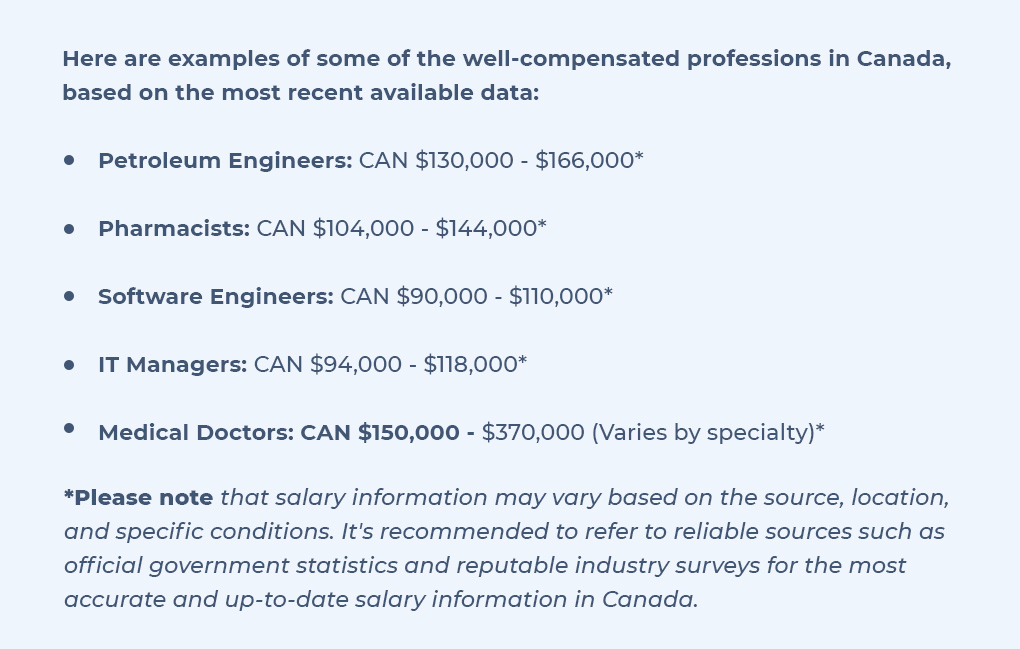
Ensuring access to quality health care is a crucial consideration for international students studying in Canada. The country provides a robust health care system, and understanding health care options and insurance requirements is essential to maintaining your well-being and financial security during your studies.
Canada offers a publicly funded health care system that provides medical services and treatments to residents and eligible non-residents, including international students.
Access to Public Health Care: International students with valid study permits are usually eligible for the public health care system in their respective provinces. However, the coverage and requirements can vary by province, and you may need to wait for a certain period before becoming eligible.
While the public health care system covers many medical services, some international students opt for private health insurance to supplement their coverage.
Advantages:
Cost:The cost of private health insurance varies depending on the coverage and the insurance provider. It's advisable to compare different insurance plans to find one that suits your needs and budget.
Prescription medications may not always be fully covered by the public health care system. You might need to pay a portion of the cost for each prescribed medication.
Cost: The cost of prescription medications can vary based on the medication itself. Some provinces have programs to help individuals with the cost of prescriptions.
Registering with a local primary care provider, known as a family doctor or general practitioner (GP), is important for accessing regular health care services and medical advice.
Advantages:
In case of medical emergencies, you can seek treatment at hospital emergency departments. Emergency medical treatment is provided free of charge, regardless of whether you have private health insurance.
It's important to research and understand the specific health care policies and insurance requirements of the province you'll be studying in, as regulations can vary across different regions of Canada.
To know more about the Health Care System of Canada read our Blog: Medical and Health care facilities for International Students in Canada

Studying in Canada not only provides a high-quality education but also offers a vibrant cultural and social experience. Engaging in cultural activities, participating in social events, and immersing yourself in the local community can enhance your overall student experience.
Here's a comprehensive guide to managing your cultural and social expenses while enjoying your time in Canada.
Canada prides itself on being a diverse and inclusive nation. Embracing this multicultural environment can lead to personal growth and a broader worldview.
Cost: Engaging with different cultures and communities often comes with little to no cost, especially when attending community events or activities.
Canadian universities offer a wide range of student clubs and associations catering to various interests. Joining these groups is an excellent way to connect with like-minded peers and engage in social and cultural activities.
Cost: Membership fees for student clubs and associations vary, but they are typically affordable. These fees contribute to the organization of events, workshops, and outings.
Canada hosts a multitude of festivals, events, and celebrations throughout the year that highlight its diverse cultural heritage. Participating in these gatherings can offer insight into local traditions.
Cost: Entry to many local events and festivals is often free or involves a nominal fee. Larger festivals or international events might have higher ticket prices.
Canada boasts world-class museums and cultural centers that showcase its rich history and heritage. Many of these institutions offer discounted or free admission for students.
Cost: Museum and cultural center entry fees can vary. Some offer free admission, while others may charge around CAN $5 to $20 for students.
Interacting with friends and fellow students often includes socializing at restaurants, cafes, or other venues. Exploring local cuisine and trying different eateries can be an enjoyable part of your experience.
Cost: The expense of socializing and dining out varies based on your preferences and the location. Budgeting around CAN $15 to $30 for a casual meal or gathering is a reasonable estimate.
Remember that your engagement with cultural and social activities can greatly enrich your time in Canada and contribute to your personal and academic development

As an international student pursuing education in Canada, you'll be immersed in a dynamic academic environment that promotes intellectual growth, independent thinking, and research excellence. This section provides a comprehensive exploration of the teaching styles and research opportunities that contribute to the enriching academic experience offered by Canadian universities.
Canadian universities are renowned for their emphasis on fostering critical thinking and collaborative learning among students. The teaching styles employed in these institutions reflect this commitment to developing well-rounded and intellectually curious individuals.
Lectures are a fundamental component of Canada's higher education system. During these sessions, professors present key concepts, theories, and ideas related to the course material. However, the focus is not solely on passive listening. Students are encouraged to actively engage with the content, ask questions, and participate in discussions.
Seminars are interactive group sessions that facilitate in-depth discussions and analysis. Students are expected to actively contribute their viewpoints, engage in debates, and share ideas. Seminars provide a platform for deeper exploration of complex topics and encourage critical thinking.
Tutorials offer personalized learning experiences, often in smaller groups. In these sessions, students collaborate closely with professors or tutors to delve into specific subjects, seek clarification, and receive feedback on assignments. Tutorials enable focused interactions, allowing students to explore topics more comprehensively.
Canadian universities are globally recognized for their innovative research contributions across various fields. International students have the unique opportunity to participate in cutting-edge research projects, contributing to their academic and professional development.
Many Canadian universities prioritize collaborative research between students and faculty members. This enables international students to actively engage in ongoing research endeavors, collaborate with experts in their fields, and contribute to the advancement of knowledge.
Even at the undergraduate level, Canadian universities encourage students to partake in research pursuits. This early exposure enables students to explore their interests, develop essential research skills, and gain insights into methodologies used in their chosen disciplines.
The well-equipped research facilities and extensive resources available at Canadian universities create a conducive environment for students to explore diverse research domains. Access to state-of-the-art laboratories, libraries, and online databases empowers students to conduct comprehensive research.
Engaging in research activities not only enhances academic experiences but also boosts employability. Involvement in research projects equips international students with problem-solving abilities, analytical thinking, and a profound understanding of their chosen fields – qualities highly prized by potential employers.

Canada's weather is diverse and can vary significantly across its vast geography. Be prepared for a range of climatic conditions, and ensure you have the appropriate clothing to stay comfortable throughout the year.
Canada's extreme seasons can impact mental well-being. Some individuals might experience Seasonal Affective Disorder (SAD) during the darker months. It's important to be aware of this and consider using light therapy lamps, spending time outdoors, or seeking support if needed. Additionally, staying active and engaging in winter sports can help combat the challenges posed by the colder seasons.

Navigating visa regulations is essential for international students planning to study in Canada. The Canadian government offers guidance on study permits, work permits, and post-graduation options.
I. Study Permits A study permit is required for most international students who plan to study in Canada. To apply for a study permit, you'll need an acceptance letter from a Designated Learning Institution (DLI) in Canada and proof of financial support to cover tuition fees, living expenses, and return transportation. II. Work Permits While studying in Canada, international students with a valid study permit can often work part-time during the academic year and full-time during scheduled breaks. The Post-Graduation Work Permit (PGWP) allows graduates from eligible programs to work in Canada for up to three years after completing their studies. III. Post-Graduation Work Permit (PGWP) The PGWP is an attractive option for international students who wish to gain work experience in Canada after graduation. The length of the PGWP depends on the duration of the program completed. IV. Visa Application Process To apply for a study permit, you'll need to follow these steps:V. Visa Extensions and Renewals If your study program lasts longer than your study permit, you'll need to extend your permit. Extensions must be applied for before your current permit expires.
It's important to refer to the official website of Immigration, Refugees and Citizenship Canada (IRCC) for the most up-to-date and accurate information on visa regulations, requirements, and application processes.
To know more about Student Visa for Studying in Canada read our blog “A comprehensive Guide to Student Visa for Canada: Types, Requirements, and Application Process”?
Canada is renowned for its overall safety and security. Nevertheless, staying vigilant and following common-sense safety practices is essential for international students.
Canada consistently ranks as one of the safest countries globally, with low crime rates in most cities and regions. Violent crime and property crime rates remain relatively low compared to many other countries.
Canadian universities prioritize the safety of their students. Many campuses have security personnel, emergency response systems, and well-lit spaces to ensure a secure learning environment.
While Canada is generally safe, it's advisable to take precautions to ensure personal safety. Avoid poorly lit areas at night, be cautious while using public transportation, and keep your belongings secure.
Canada has efficient emergency services, including police, fire, and medical assistance. The emergency number to call is 911, which connects you to the appropriate services in case of an emergency.
Canada is susceptible to certain natural disasters, such as winter storms, wildfires, and earthquakes in certain regions. Familiarize yourself with emergency protocols specific to your location and stay informed about weather and disaster alerts.
Maintaining good health is crucial. Make use of the healthcare services available, whether through your institution or the public healthcare system. Carry necessary health insurance and follow recommended health guidelines.
Respect for cultural diversity is important in Canada. It's recommended to learn about the local customs and cultural norms to ensure you interact respectfully with others.
Public transportation in Canada is generally safe and reliable. However, be cautious while traveling at night, and keep an eye on your belongings.
It's important to stay informed about safety resources and guidelines provided by your educational institution, local authorities, and official government sources to ensure a secure and enjoyable stay in Canada.
To know more, read our Blog: "Safety and Security for International Students in the Canada"

Managing your finances effectively while studying in Canada is essential. Opening a bank account in Canada offers convenient access to your funds and simplifies various financial transactions, including paying tuition fees, rent, and daily expenses.
Canada also offers digital banking alternatives like Tangerine, EQ Bank, and Simplii Financial, which provide online and app-based banking services. These digital banks often offer competitive interest rates and user-friendly interfaces.
Opening a bank account in Canada ensures efficient financial management and contributes to a smooth experience while studying in the country.
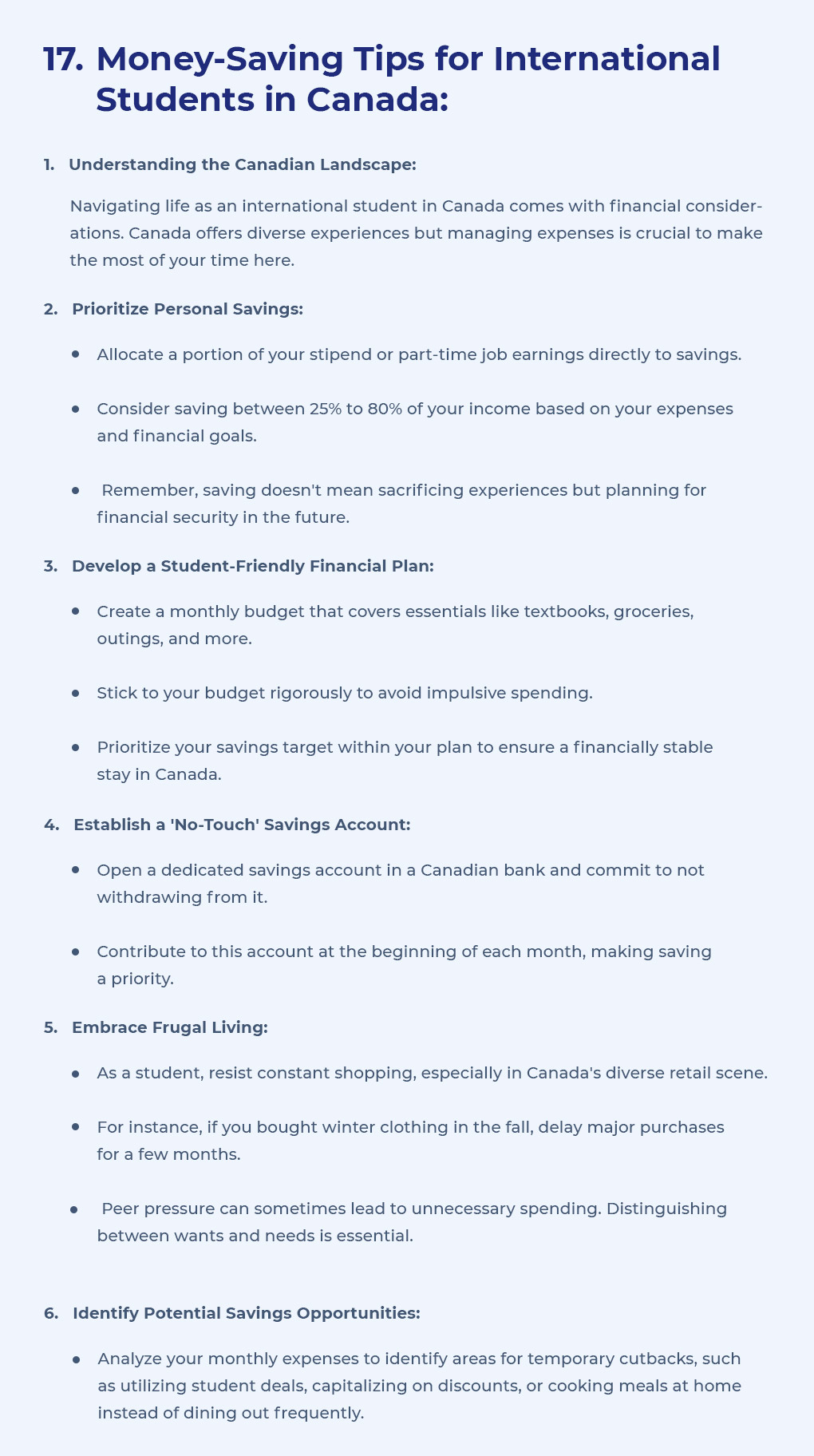
Embarking on the journey of being an international student in Canada presents a fusion of educational quality, cultural richness, and personal development. With strong support networks, ample employment prospects, and a thriving social environment, Canada remains a sought-after destination for students aspiring to achieve academic excellence while enjoying a high quality of life. Embrace the adventure, seize the opportunities, and allow Canada to leave an enduring imprint on your academic and personal voyage.

Studying abroad is an exciting and life-changing experience that offers students a chance to gain a global perspective and valuable exposure ...

In our rapidly globalizing world, where boundaries are melting away and opportunities abound, proficiency in the English language has become ...

Choosing to pursue higher education abroad is an exciting and life-changing decision. Among the plethora of options available to internationa...

Studying abroad is a life-altering adventure that opens doors to new cultures, experiences, and opportunities. Among the plethora of global s...

Australia, renowned for its world-class education and diverse cultural experiences, continues to be a favoured destination for international ...

Australia is not just famous for its iconic Sydney Opera House, the Great Barrier Reef, and its unique wildlife; it is also recognized global...

Studying abroad is a life-changing decision, and with so many options available, it can be overwhelming to choose the right country and univers...

As of March 2022, Australia has seen a consistent rise in its international student numbers, with enrolments reaching 440,219. This marks an ...